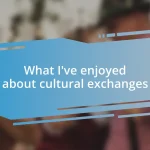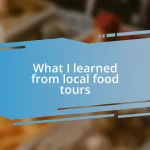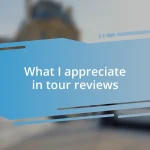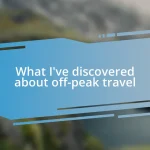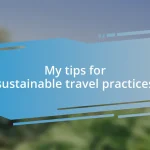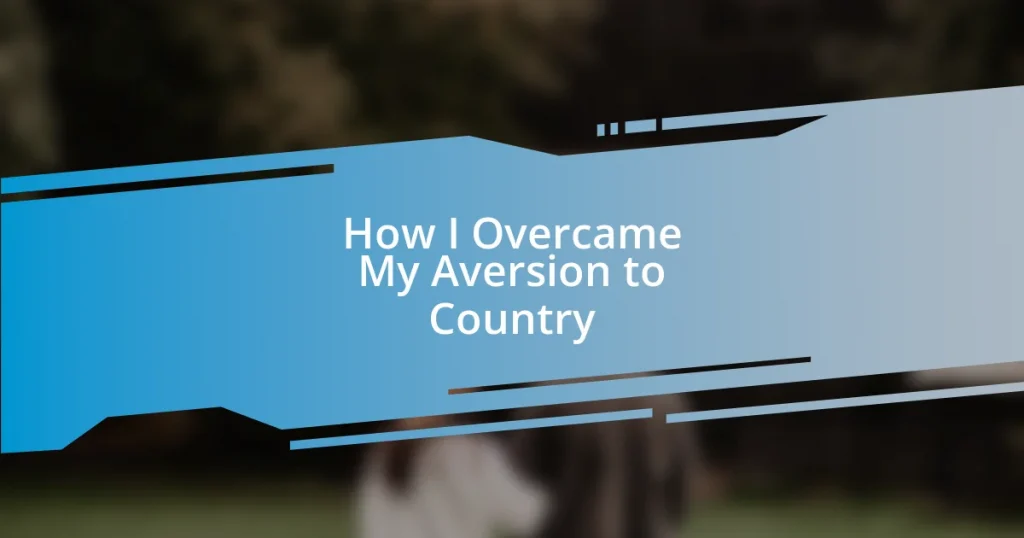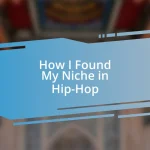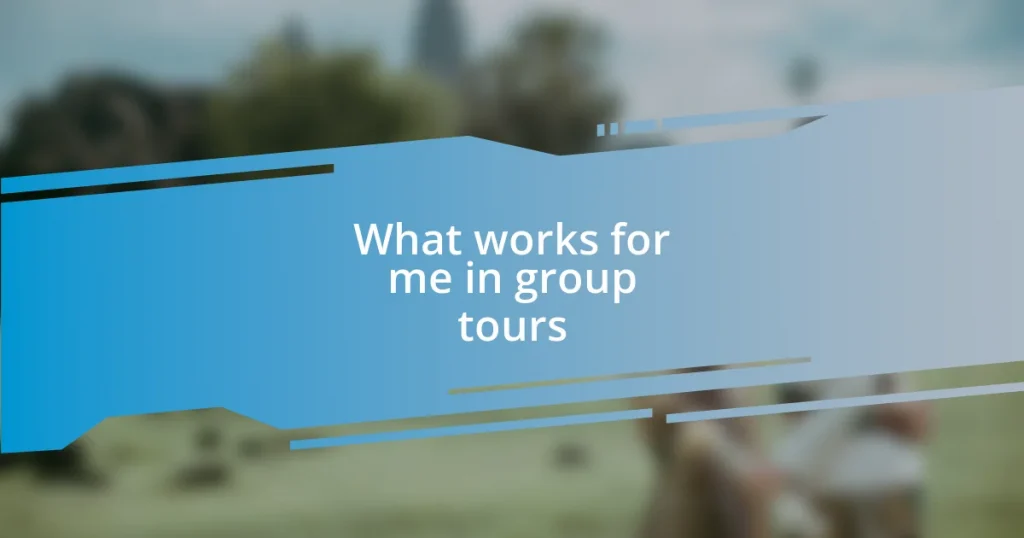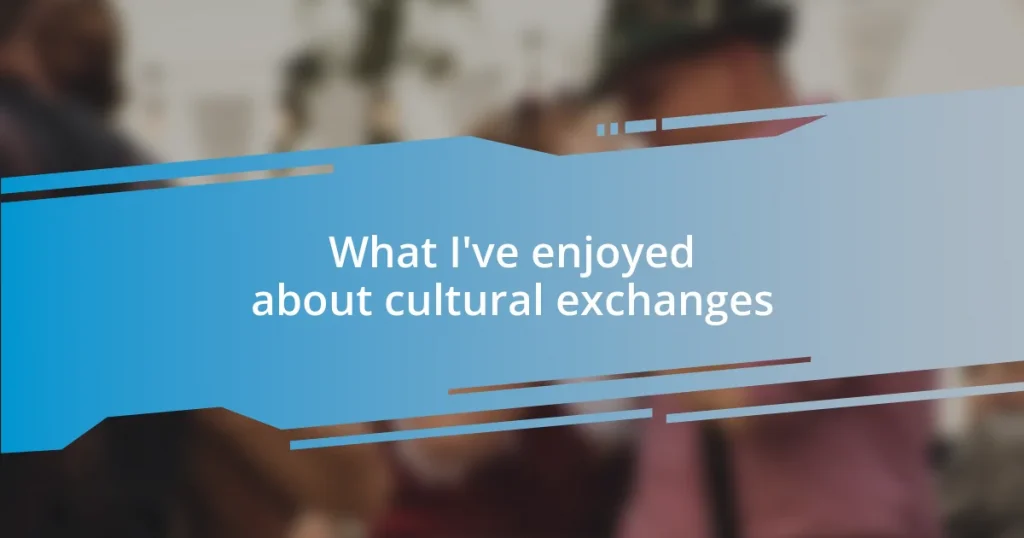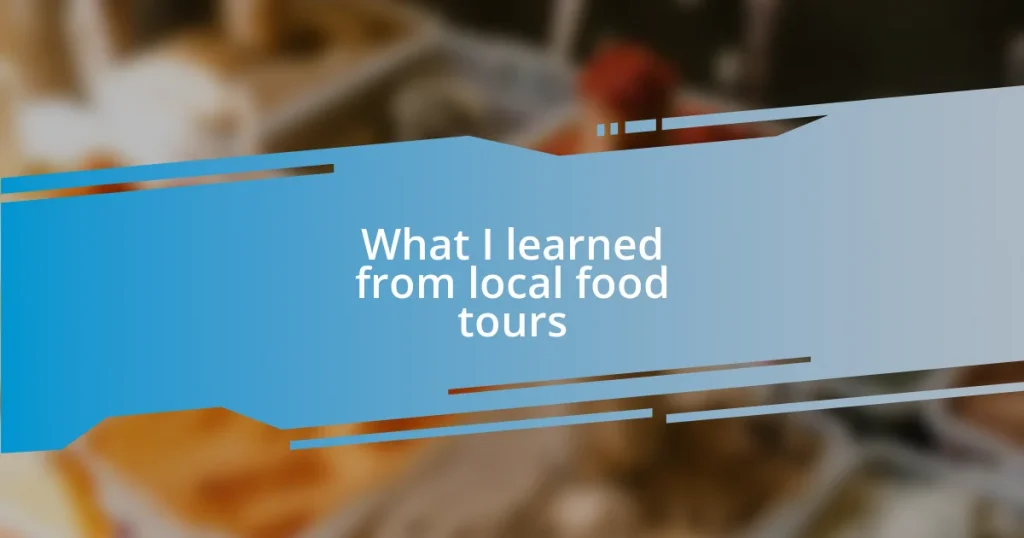Key takeaways:
- Initial aversion to country music stemmed from lack of exposure and the influence of cultural stereotypes about the genre.
- Engaging with live events and local communities fostered a sense of connection and appreciation for the storytelling within country music.
- Personal memories and experiences resonated with country music themes, revealing the genre’s ability to evoke deep emotional connections and universal truths.
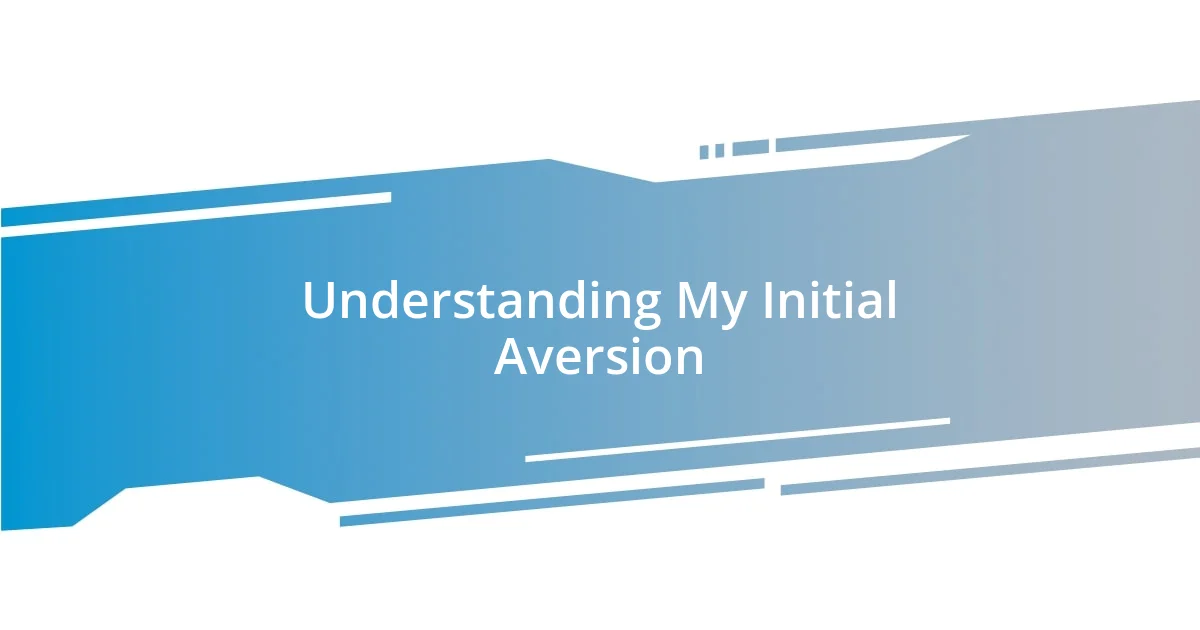
Understanding My Initial Aversion
When I reflect on my initial aversion to country music, I remember how my early experiences framed my perspective. Growing up in a bustling city, the twang of a guitar and the storytelling lyrics felt foreign to me. It was like trying to appreciate a language I didn’t yet understand—didn’t they have anything more exciting to sing about?
I also recall the teasing I faced from friends who dismissed country as “hillbilly music.” Their laughter made me self-conscious, creating an invisible barrier between me and the genre. I thought, “How could I ever enjoy something that seemed so out of place in my life?” It wasn’t just the sound; it intertwined with my identity and the expectations of those around me.
As I navigated these feelings, I began to realize that my aversion stemmed from a lack of exposure and understanding rather than genuine dislike. I couldn’t help but wonder if there were stories behind those songs that resonated with experiences I had yet to discover. Perhaps I was missing out on a rich tapestry of emotions simply because I hadn’t tried to dig deeper.
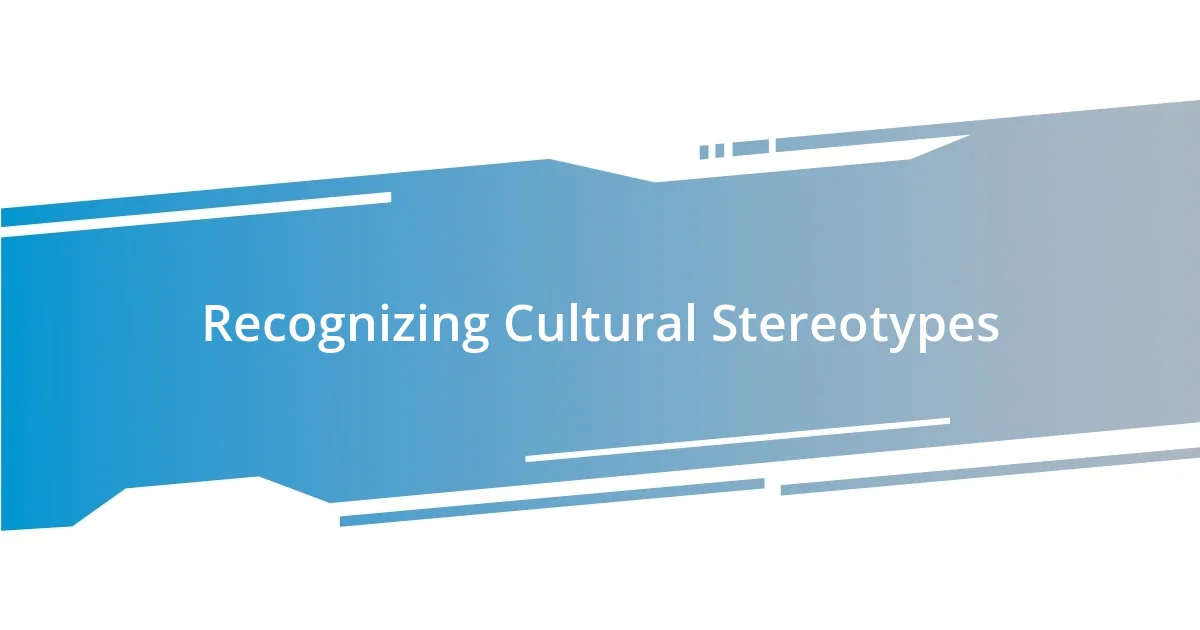
Recognizing Cultural Stereotypes
Recognizing cultural stereotypes can be eye-opening. For instance, I often came across the stereotype that country music is only for those living in rural areas. But my journey showed me that even urban dwellers can find solace and connection in its storytelling. I remember the moment I met a college professor in New York City who lit up discussing her love for artists like Johnny Cash. It made me question, who decides who enjoys what type of music?
As I listened deeper, I realized that a lot of my bias came from overgeneralizations. Stereotypes can be limiting and fail to acknowledge the diversity within cultures. I discovered songs that spoke about love, loss, and resilience—universal themes that transcended geographic boundaries. This helped me confront my own preconceptions and the need to embrace a broader perspective.
Through this process, I learned that wrestling with stereotypes is part of unraveling a deeper appreciation for cultural expressions. My initial hesitation transformed into curiosity, urging me to explore further. It prompted me to ask, what other voices have I overlooked simply because they didn’t fit a narrative I was accustomed to?
| Cultural Stereotype | Reality |
|---|---|
| Only Rural Preference | Country music is loved by listeners in urban areas too. |
| Simplistic Themes | Many country songs explore complex emotions like love and loss. |
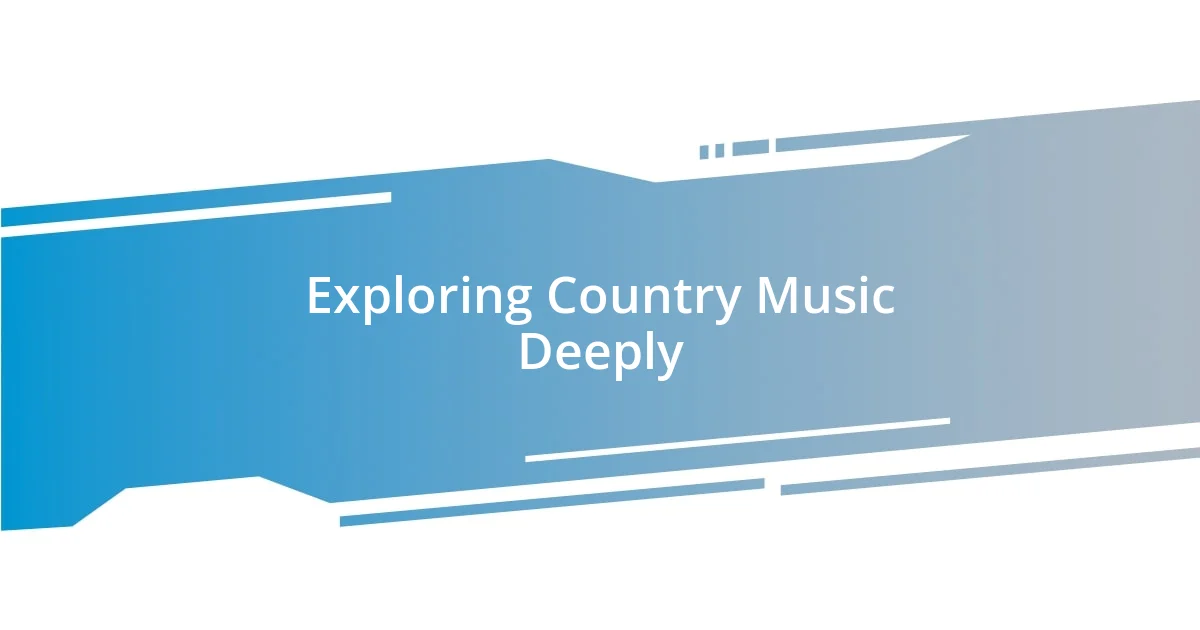
Exploring Country Music Deeply
As I dove into the world of country music, I found myself captivated by the depth of its storytelling. Each song felt like a brief, intimate conversation—sometimes heartbreaking, often uplifting. There was a particular moment when I stumbled upon a song by Kacey Musgraves that spoke of small-town life but echoed my own experiences of feeling lost and searching for identity. That connection struck a chord within me, revealing that these songs often mirror universal emotions that transcend any geographic backdrop.
- Country music often blends personal anecdotes with relatable themes, creating a narrative that feels both intimate and universal.
- Artists like Chris Stapleton and Miranda Lambert showcase a raw intensity in their lyrics, often drawing from their own life experiences, which adds to the authenticity.
- I discovered that songs about heartache or joyous moments can evoke feelings I didn’t know I had, prompting reflective conversations with myself.
- Listening to live performances, especially in small venues, allowed me to appreciate the energy and emotion that artists pour into their craft—it’s like sharing a story with a friend.
Digging deeper into the genre led me to explore its rich history and roots, from folk traditions to blues influences. I remember spending an evening with friends, sharing playlists and discovering how artists like Dolly Parton inspired generations, not just through their music but their resilience. This exploration opened my eyes to the diversity within country music, showcasing its ability to evolve while still resonating with core human experiences. The journey reminded me that music can bridge gaps and that every genre has layers waiting to be uncovered.
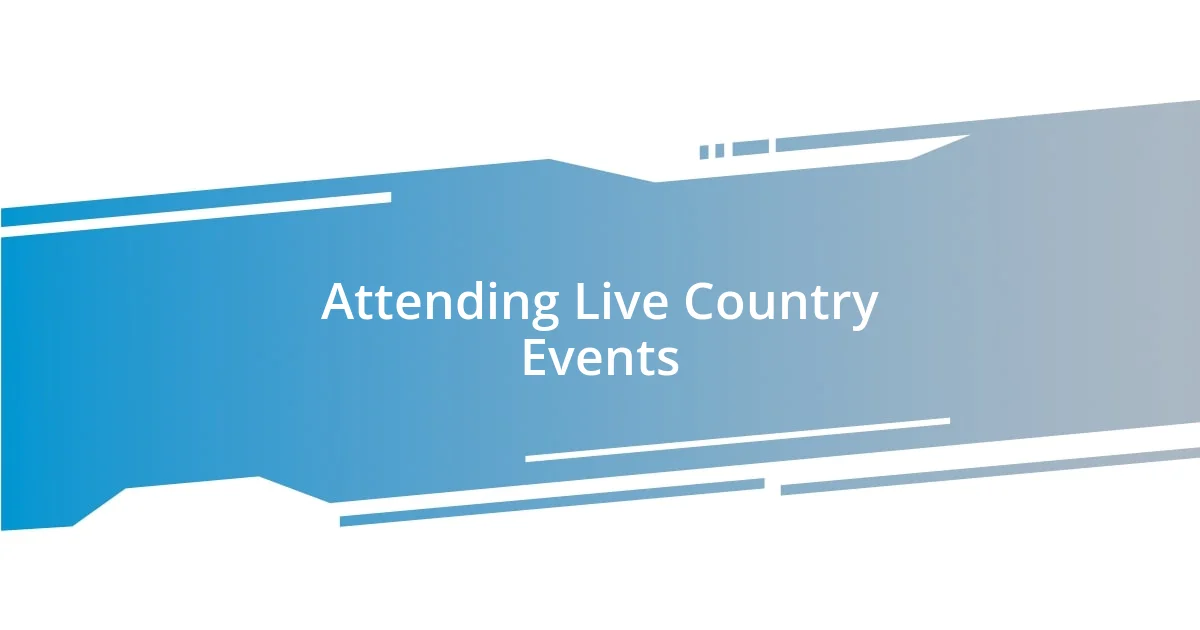
Attending Live Country Events
Attending live country events was a game-changer for me. I vividly recall my first concert—an intimate setting filled with friendly faces. The moment the lights dimmed, and the first chord struck, I felt a rush of excitement. It wasn’t just about the music; it was about being part of a community with shared feelings and experiences. Have you ever felt that electric energy from a live show? It’s something that can’t be replicated through headphones.
As I soaked in the atmosphere, I noticed how the crowd sang along to each song, their voices harmonizing like a choir woven together by similar stories. It was refreshing to be surrounded by people who not only appreciated the music but also connected with its message. I remember sharing a laugh and a dance with strangers, each lyric resonating with a life anecdote or a cherished memory. Those moments brought realizations about how music creates bonds that transcend initial aversions.
After that concert, I began seeking more live events. I even attended a country music festival, where the joy was palpable. Watching artists pour their souls into performances made me understand the passion behind the genre. It struck me—how had I missed this connection all along? Experiencing the rhythm and the raw emotion expressed on stage helped dismantle the barriers I had built around my own perceptions. I left each event feeling elevated, a little more open-minded, and eager to explore the nuances of country music further.
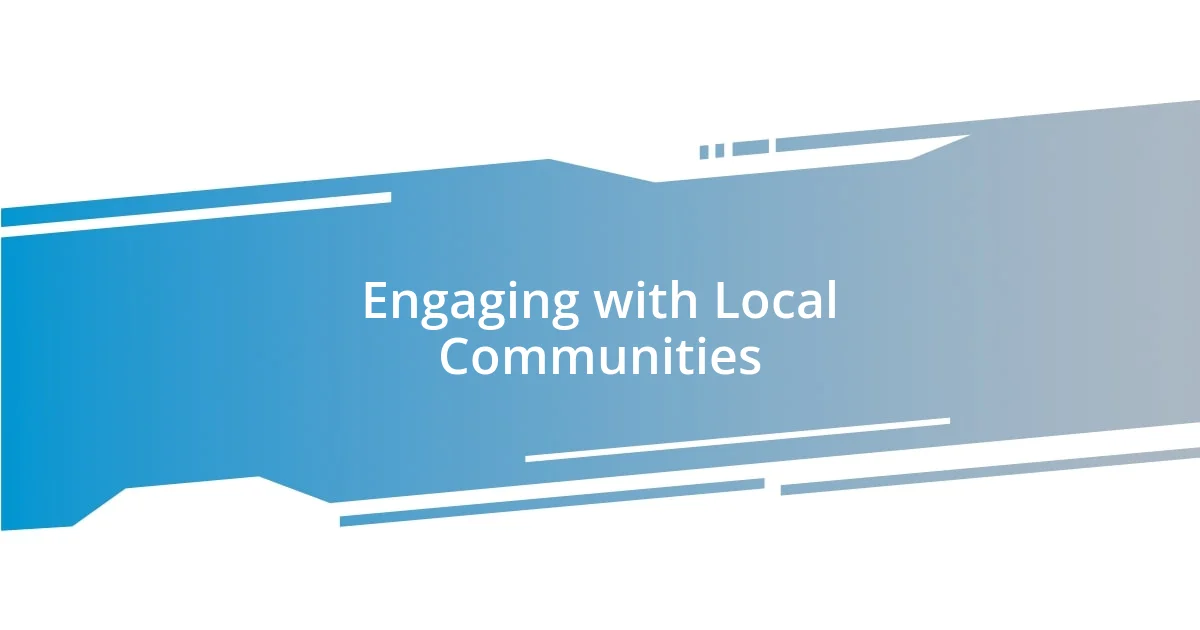
Engaging with Local Communities
Engaging with local communities opened my eyes to the warmth and connection that often lies outside my comfort zone. I remember volunteering at a country fair in a nearby town, where I met locals eager to share their stories. The genuine smiles and open conversations I encountered were enlightening; it struck me how much I had undervalued that face-to-face connection. Have you ever felt that sense of belonging, even among strangers? It was as if we were woven together by shared traditions and experiences, making me appreciate the fabric of community life.
Participating in local events transformed my perception of country culture. One time, I attended a potluck hosted by a community group, and each dish brought a flavor of someone’s heritage. I can still fondly recall a spirited discussion about family recipes with a grandmother who proudly shared her secret cornbread technique. That evening, I realized how food, like music, is a beautiful conduit for storytelling and connection. It was through these shared moments that I started feeling more included in the narrative, fueling my desire to learn about the people behind the songs.
I began to engage with local gatherings and realized that they offered a glimpse into the heart of country life. At an outdoor jam session, I chatted with a young artist who shared her journey from aspiring singer to finding community support. Her laughter was infectious, and her passion sparked a realization; the struggles and triumphs we all experience are deeply relatable. It hit home that engaging with these communities not only broadened my understanding of country culture but also enriched my own life experiences. Isn’t it amazing how stepping beyond our preconceived notions can lead to unexpected joy?
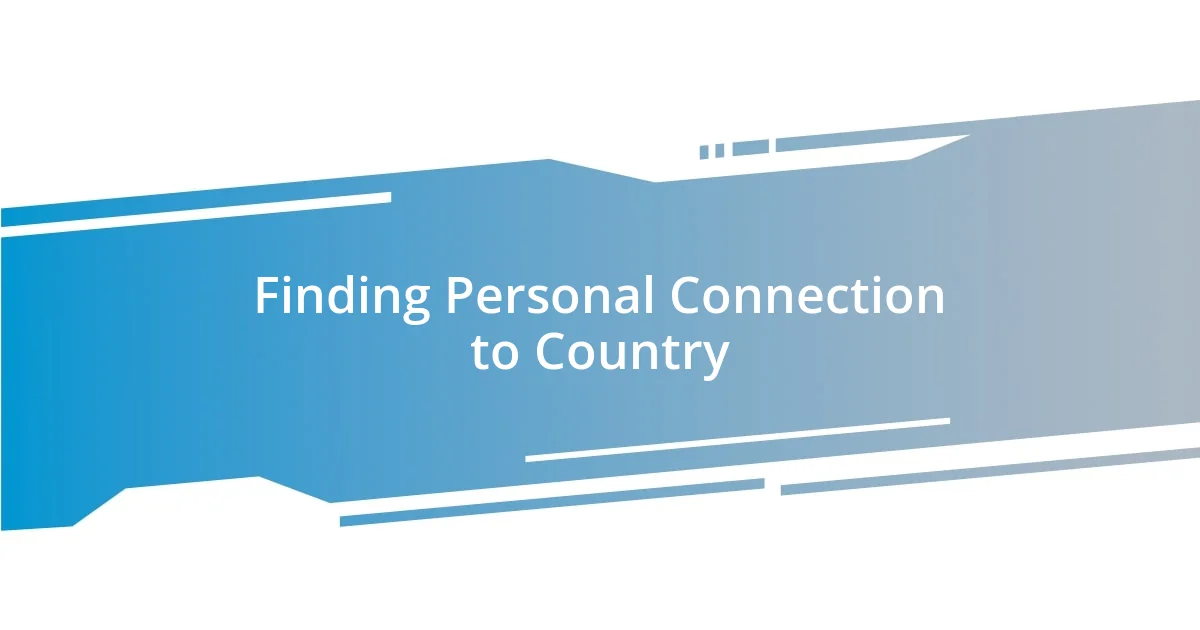
Finding Personal Connection to Country
Finding a personal connection to country music created a significant shift in my perception of the genre. One afternoon, I discovered an old vinyl record in my parents’ collection, filled with classic country tunes. As I listened, I was transported back to summers spent on my grandparent’s porch, where my grandmother would sing along to her favorite songs. Suddenly, the twang of the guitar and the storytelling lyrics took on a new meaning, reminiscent of those simpler, carefree times. Isn’t it incredible how a piece of music can evoke memories and emotions buried deep within us?
I also remember a road trip where I decided to give a country playlist a chance. With each song, I felt my reservations melting away as the lyrics painted vivid pictures of love, heartbreak, and rural life. The highway stretched out before me, and I found a sense of freedom in the stories being told. I wondered, could this music be a reflection of my own experiences? That connection made the journey feel not just like a drive but a shared adventure of emotions and narratives—one that resonated with my own life journey.
As I delved deeper into the lyrics, it became clear that country music often captures the essence of human experiences in a relatable way. One night, I found myself sitting on my back porch, reflecting on a song about resilience. The artist spoke about overcoming obstacles, which resonated with my own struggles and victories. I realized that beneath the surface of the genre lay a treasure trove of universal themes that mirror our own stories. Isn’t it fascinating how music, at its core, connects us to each other and helps us navigate our individual paths?


